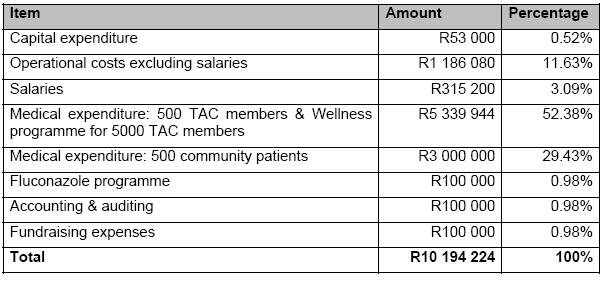| The TAC Treatment Project |
|
|
|
| Sitemap |
| Printable version |
| Email us |
| login |
| Last update: March 17. 2005 14:39:49 |
| You can save a life! > Funding proposal | ||
Funding proposalDownload the complete funding proposal in PDF format here (10 pages). IntroductionJohn Vollenhoven is a resident of Atlantis one of the poorest townships of the Western Cape. He is a father of two children. After starting antiretroviral therapy he has a better chance of surviving AIDS and has already improved his quality of life. Uncle John is one of twenty-five TAC members selected across the country to be treated on the TAC Treatment Project. The Treatment Action Campaign has campaigned for medicine price reductions, for the development of a national treatment plan and for communities to become treatment literate. TAC has supported the MSF programme in Khayelitsha that treats more than 400 people with antiretrovirals and provides medical services to more than 4000 people living with HIV/AIDS. TAC has also helped ARV programmes in Johannesburg, Soweto and Durban. On a daily basis, TAC members across the country engage in HIV prevention and treatment education. In the last six months, TAC has lost more than 100 members whose lives could have been saved with antiretroviral therapy. Therefore, we formed the TAC Treatment Project. However, TAC believes that everyone has a right to life. So, for every TAC member treated, the TAC Treatment Project commits to treating a person in the community who is unrelated to TAC. We also want to make a direct contribution to saving lives. Medical and administrative costs of the TAC Treatment Project (including a wellness programme for 5000 TAC members, TACs fluconazole programme and antiretroviral treatment for 500 community and 500 TAC members) would need approximately R10.2 million in the 2004/05 financial year. A detailed budget is attached to this document. Medical expenditure for the TAC members at R7609 per patient per year 1 or R634 per month is slightly higher than the R6000 per patient per year budgeted for community slots, owing to the lower costs associated with using exclusively public sector facilities. For detailed calculations please see the attached budget. Estimates of administrative and support spending higher than in a single-site treatment project and necessitated by patients being unable to pay even for their transport are based on the experience of the TAC Treatment Project in its first months of operation. The figure of R10.2 million assumes that 1000 patients are treated for an entire year and includes all capital, administrative, medical and other costs. Budget Summary 2004/2005: 1000 people on ARVs & 5000 on wellness programmes
The TAC Treatment Project was formed in June 2003 with the following aims:
The TAC Treatment Project would rely on the financial contributions of ordinary people in South Africa in its work. On the 8th of August 2003 the South African government instructed the Ministry of Health to develop an operational plan for the provision of antiretroviral treatment in the public sector. This plan is due at the end of September 2003. Government estimates that 500 000 people need antiretroviral medicines now. Initial government programmes will not reach more than 30% of people who need treatment. Many communities will have to wait years before the phased rollout reaches them. We have a duty to treat as many people that government cannot reach as possible. In order to ensure that the public sector programme is a success, and that the HIV/AIDS pandemic does not destroy more of our families and communities, other sectors of society like organised business, organised labour, civil society and private healthcare providers have to assist the public healthcare system. The TAC Treatment Project is a Section 21 (non-profit) company established by the Treatment Action Campaign to make affordable Highly Active Antiretroviral Therapy (HAART) available to people living with HIV/AIDS in South Africa. This will be done on a fully, partially or unsubsidised basis. While the TAC TP has a close relationship with the TAC, it is organisationally and financially independent. Any funds raised by the TAC TP will be used solely for treatment and related support services. The TAC Treatment project aims to have 50 people on antiretrovirals by December 2003 and 1000 people on antiretrovirals by December 2004. These will be fully subsidised places. Fully subsidised treatment (including medicines, laboratory monitoring and doctors consultations) will be made available to an equal number of treatment activists and community members not members of the TAC. In other words, for every TAC (or other treatment access) activist treated there will be a corresponding community member treated. TAC activists will be treated directly through TAC TP. While TAC TP will fund medicines and support for other community members, their actual treatment will be administered through public health facilities. Only public sites that meet rigorous standards, clinical selection criteria and levels of care maintained by TAC TP will be used. This funding proposal relates to fully subsidised treatment for activists and communities. Partial subsidisation refers to patients who make a voluntary contribution to the project (which will in no way affect their chances of selection or level of care and support). For unsubsidised treatment the TAC Treatment Project will operate as a non-profit distributor of generic antiretrovirals not otherwise available. Any surplus realised will be used to subsidise treatment. Submenu
|
| < | TOP | > |
